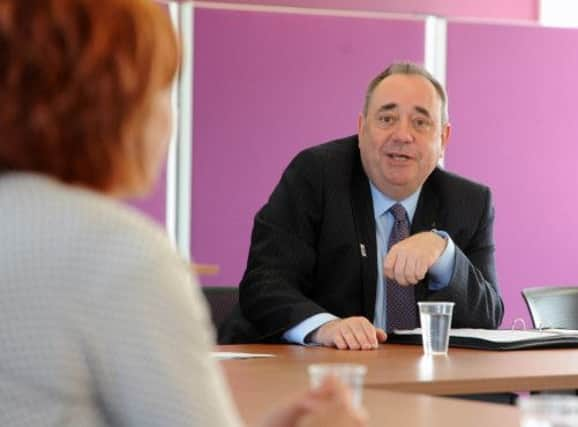Leaders: Pollsters should not write off Salmond


Fat chance of that, of course, but it is interesting that Mr Silver is so sure.
He shot to fame during the last US presidential election campaign when he correctly predicted not just that Barack Obama would beat Mitt Romney in the 2012 US presidential election, but also correctly called the outcome between the two men in all 50 US states. TV pundits who had described the races as too close to call were aghast to hear their presenters calling the hitherto relatively unknown Mr Silver also to be the winner of the election.
Advertisement
Hide AdAdvertisement
Hide AdHe has now told The Scotsman that there is “virtually no chance” that the Yes campaign will win. Its hopes rest, he reckons, on some unforeseeable dramatic event outside Scotland, such as a split in the eurozone, which dramatically alters politics south of the Border and leads to Scots rethinking where their best economic interests lie.
Mr Silver is not a pollster as such. He is a mathematician and relied on mathematical analysis, leavened with a degree of political astuteness, to make his presidential election prediction based, in part, on polling. By ignoring what he calls “noise”, such as polls which seem extreme and the analysis offered by partisan spin doctors, and by applying mathematical techniques to dissect the trends shown in mainstream polling data, Mr Silver is able to come up with astoundingly accurate predictions.
He has evidently being doing that since April, when he declared in his New York Times blog that the outcome of Scotland’s referendum was a 50-50 coin flip and could not be called. The Yes campaign would probably prefer if he had stopped at that point. But he has since been analysing trends, comparing them to yes/no votes elsewhere in the world and concluded it is unlikely Mr Salmond can turn his present polling deficit into victory. The “no” case tends to predominate at the start of such campaigns, he says, and to grow during them.
Some of his analysis, however, can be questioned. It is true that during the 1995 Quebec independence referendum campaign, the “Yes” camp was ahead in the months beforehand, but lost. This glosses over more detailed analysis which shows that, at the start of the two-month campaign, the “Yes” side had lost its pre-campaign lead, but regained ground during the heat of the debate, eventually losing by a hairsbreadth.
Mathematics is a precise science and while it can bring some precision to political polling analysis, prediction is a more uncertain question of probabilities. Thus while Mr Silver may predict that Mr Salmond will lose, that is by no means certain. One thing we have learned in Scottish politics is that we should never underestimate the SNP under Mr Salmond’s leadership.
We must ditch politics of the gutter
IF IT were true that big British companies which have a considerable presence on the high street and in retail parks had quietly adopted a policy of ignoring unemployed British workers in favour of cheaper eastern European workers, it would be shocking.
This was the allegation that Chris Bryant MP, Labour’ immigration spokesman, was going to make in a speech yesterday. But after the companies strenuously denied the claims when an advance version of the speech appeared in a Sunday newspaper, Mr Bryant modified the allegation, watering it down considerably. This comes after a decision by the Advertising Standards Authority to investigate ad vans driving around London under commission from the Home Office advising illegal immigrants that they should “go home or face arrest”. The first two words of that slogan echo, perhaps deliberately and if so, scandalously, a phrase routinely used by nasty far-right groups about all non-white immigrants, legal and illegal.
Is this the level to which political debate about immigration has descended? The hurling about of half-truths and threats? Yes, there is legitimate public concern about the number of people from other countries coming to work in Britain, and the number of them doing so illegally. But for the major parties to resort to this kind of dog-whistle politics is disgraceful.
Advertisement
Hide AdAdvertisement
Hide AdIt risks inviting the kind of behaviour that can all too easily blow up, especially in the heat of summer nights, into civil disorder in which innocent people get injured and their property destroyed. There is a place for public discussion about immigration and what constitutes legal and acceptable recruitment behaviour by companies. But it needs to be conducted much more responsibly.
SEE ALSO